Related Research Articles
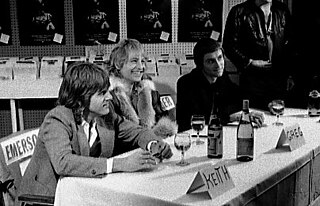
Emerson, Lake & Palmer were an English progressive rock supergroup formed in London in 1970. The band consisted of Keith Emerson (keyboards) of the Nice, Greg Lake of King Crimson, and Carl Palmer of Atomic Rooster. With nine RIAA-certified gold record albums in the US, and an estimated 48 million records sold worldwide, they are one of the most popular and commercially successful progressive rock groups of the 1970s, with a musical sound including adaptations of classical music with jazz and symphonic rock elements, dominated by Emerson's flamboyant use of the Hammond organ, Moog synthesizer, and piano.

Keith Noel Emerson was an English keyboardist, songwriter, composer and record producer. He played keyboards in a number of bands before finding his first commercial success with the Nice in the late 1960s. He became internationally famous for his work with the Nice, which included writing rock arrangements of classical music. After leaving the Nice in 1970, he was a founding member of Emerson, Lake & Palmer (ELP), one of the early progressive rock supergroups.
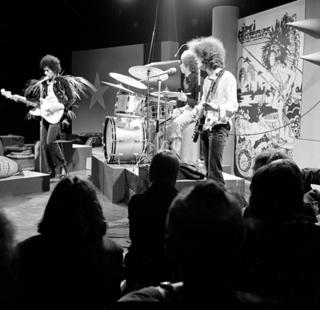
A power trio is a rock and roll band format having a lineup of electric guitar, bass guitar and drum kit, leaving out a dedicated vocalist or an additional rhythm guitar or keyboard instrument that are often used in other rock music bands that are quartets and quintets. Larger rock bands often use one or more additional rhythm sections to fill out the sound with chords and harmony parts.
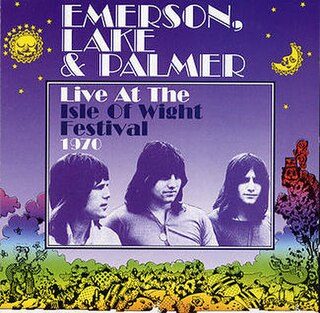
Live at the Isle of Wight Festival 1970 is an album by British progressive rock band Emerson, Lake & Palmer, recorded at the Isle of Wight Festival in 1970 and released on CD in 1997. At this concert ELP played "Pictures at an Exhibition".

Pictures at an Exhibition is a live album by English progressive rock band Emerson, Lake & Palmer, released in November 1971 on Island Records. It features the group's rock adaptation of Pictures at an Exhibition by Modest Mussorgsky, performed at Newcastle City Hall on 26 March 1971.

Tarkus is the second studio album by English progressive rock band Emerson, Lake & Palmer, released on 14 June 1971 on Island Records. Following their debut tour across Europe during the second half of 1970, the group paused touring commitments in January 1971 to record a new album at Advision Studios in London. Greg Lake produced the album with Eddy Offord as engineer.

Brain Salad Surgery is the fourth studio album by English progressive rock band Emerson, Lake & Palmer, released on 7 December 1973 by their new record label, Manticore Records, and distributed by Atlantic Records.

Works Volume 1 is the fifth studio album by English progressive rock band Emerson, Lake & Palmer, released as a double album in March 1977 on Atlantic Records. Following their world tour supporting Brain Salad Surgery (1973), the group took an extended break before they reconvened in 1976 to record a new album. They were now tax exiles and recorded new material in London and overseas in Montreux, Switzerland and Paris, France. Works Volume 1 features a side dedicated for each member to write and arrange their own tracks, while the fourth side features songs performed collectively. Keith Emerson recorded his Piano Concerto No. 1, Greg Lake wrote several songs with lyricist Peter Sinfield, and Carl Palmer recorded tracks of varied musical styles.
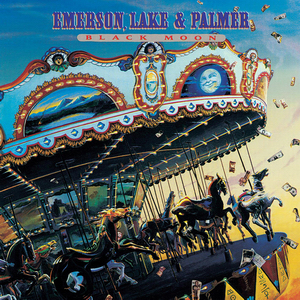
Black Moon is the eighth studio album, and the first in fourteen years, by English progressive rock band Emerson, Lake & Palmer, released in May 1992. The band had broken up in 1979, and recorded Black Moon to kick off their 1990s revival.

Gregory Stuart Lake was an English bassist, guitarist, singer, and songwriter. He gained prominence as a founding member of the progressive rock bands King Crimson and Emerson, Lake & Palmer (ELP).

Trilogy is the third studio album by English progressive rock supergroup Emerson, Lake & Palmer, released in June 1972, by Island Records. The group had spent most of 1971 touring, and paused in September so they could record a new album at Advision Studios with Eddy Offord resuming his role as engineer. It would be his last with the group, as he later elected to work full-time with Yes. The album features "Hoedown", an arrangement of Aaron Copland's ballet composition which became a live favourite.

Emerson, Lake & Palmer is the debut studio album by English progressive rock band Emerson, Lake & Palmer. It was released in the United Kingdom by Island Records in November 1970, and in the United States by Cotillion Records in January 1971. After the group formed in the spring of 1970, they entered rehearsals and prepared material for an album which became a mix of original songs and rock arrangements of classical music. The album was recorded at Advision Studios in July 1970, when the band had yet to perform live. Lead vocalist and bassist/guitarist Greg Lake produced it.
"Tarkus" is the title track of Emerson, Lake & Palmer's second album. The progressive rock epic lasts 20:35. It was the longest studio suite by the band until the three impressions of "Karn Evil 9". The name "Tarkus" refers to the armadillo-tank from the William Neal paintings on the album cover. The artist has explained that the name is an amalgamation between 'Tartarus' and 'carcass'. Consequently, the name refers to the "futility of war, a man made mess with symbols of mutated destruction." The song "Tarkus" supposedly follows the adventures of Tarkus from his birth, through a fight with a manticore, which he loses and concludes with an aquatic version of Tarkus named "Aquatarkus". Keith Emerson, when asked what work he is proudest of, named his "Piano Concerto" and "Tarkus".
"Karn Evil 9" is an extended work by progressive rock group Emerson, Lake & Palmer, appearing on the album Brain Salad Surgery. A futuristic fusion of rock and classical themes, it was written by band members Keith Emerson and Greg Lake with former King Crimson lyricist Peter Sinfield. It is the fifth and final track on Brain Salad Surgery and, with a running length of 29 minutes and 37 seconds, is Emerson, Lake & Palmer's longest studio recording. The initial release of the album on vinyl split "Karn Evil 9" between the two sides due to its length, with a fade out/fade in between First Impression Parts 1 and 2.
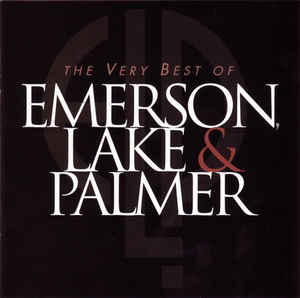
The Very Best of Emerson, Lake & Palmer is a greatest hits album by the British progressive rock band Emerson, Lake & Palmer, released in 2000.
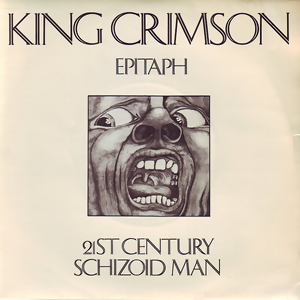
"Epitaph" is the third track on British progressive rock band King Crimson's 1969 album In the Court of the Crimson King. It was written by Robert Fripp, Ian McDonald, Greg Lake, and Michael Giles with lyrics written by Peter Sinfield.
"Take a Pebble" is a song by the British progressive rock group Emerson, Lake & Palmer. It is the second track of their eponymous debut album. It was written by Greg Lake, and arranged by the full band.

"Lucky Man" is a song by the English progressive rock supergroup Emerson, Lake & Palmer, from the group's 1970 self-titled debut album. Written by Greg Lake when he was 12 years old and recorded by the trio using improvised arrangements, the song contains one of rock music's earliest instances of a Moog synthesizer solo. "Lucky Man" was released as a single in 1970 and reached the top 20 in the Netherlands. The song also charted in the United States and Canada. The single was re-released in 1973 and charted again in the U.S. and Canada.

Still is the first, and to date only, solo album by Pete Sinfield, former lyricist of progressive rock band King Crimson, released in 1973. At the time, Sinfield was involved with Emerson, Lake & Palmer, and Greg Lake assisted with vocals, while other King Crimson alumni provided assistance. The cover artwork depicts "The Big Friend" by German artist Sulamith Wülfing.
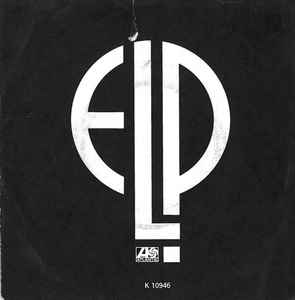
"Fanfare for the Common Man" is an instrumental piece of music adapted and played by the English progressive rock band Emerson, Lake & Palmer, from the group's 1977 Works Volume I album. Adapted by Keith Emerson from Aaron Copland's 1942 piece of the same name, it is one of their most popular and enduring pieces.
References
- ↑ Romano, Will (2010). Mountains Come Out of the Sky - The Illustrated History of Prog Rock.
- ↑ Stump, Paul (1997). The Music's All that Matters: A History of Progressive Rock. Quartet Books Limited. p. 98. ISBN 0-7043-8036-6.
- 1 2 "The Barbarian by Emerson, Lake & Palmer". Songfacts.com. Retrieved 29 May 2022.
- ↑ Gecevičiūtė, Agnė. "A plastic approach to musical meaning : An analysis of the Barbarian by Emerson, Lake & Palmer". Actes Sémiotiques. 119.
- ↑ "Emerson, Lake & Palmer - the Barbarian Lyrics". Letssingit.com.